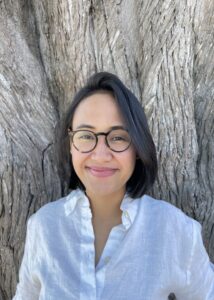Meet Our Wadsworth International Fellows: Inditian Latifa
 With the support of the Wadsworth International Fellowship Inditian Latifa will continue training in social-cultural anthropology at the University of California, Santa Cruz, hosted by Anna Tsing.
With the support of the Wadsworth International Fellowship Inditian Latifa will continue training in social-cultural anthropology at the University of California, Santa Cruz, hosted by Anna Tsing.
My path to anthropology, like many other things in life, did not follow a straight line. After finishing high school in Indonesia, I chose to study English at the University of Indonesia for my bachelor’s degree rather than anthropology. It was a practical decision based on my experience of English as a gatekeeper to education and employment, which it continues to be. Fortunately, the English Department I attended had a cultural studies bent. I developed an interest in language, power, and history and went on to continue my studies in Global Studies at Leipzig University and the University of Vienna. My first encounter with anthropology was in a class on globalization, where we were assigned to read Anna Tsing’s Friction alongside Aihwa Ong’s Flexible Citizenship. Their work in particular pushed me to learn more about anthropology and to eventually pursue anthropological training.
Given my research interests are in the areas of environment, economy, and religion, the Anthropology Department at the University of California, Santa Cruz provides the ideal intellectual environment for me. Under the guidance of Anna Tsing, my project will focus on the kinds of interrelationship between people, animals, plants, and things that are cultivated through the widespread Islamic practice of waqf (God’s property). I’m interested in how notions of responsibility, reciprocity, and sacrifice are played out in the material and conceptual spaces that waqf creates, given the increasing hegemony of the structuring logics of global capitalism and the modern-secular state project. If the Covid-19 pandemic situation permits, I will be conducting fieldwork in Indonesia where waqf practices have seen a revival and re-figuration since the 2000s.
A common question I hear is, “Why is an Indonesian studying Indonesia?” The idea of a “native” working in their own society does seem to go against the principle of surprise that constitutes ethnography. Yet as someone who was born and raised in the urban areas of Java, I am cautious of assuming too much about my interlocutors who will primarily be Muslim villagers in Aceh, Sumatra. As Marilyn Strathern so aptly observed in her reflection on “anthropology at home”, there is an inevitable social distance between scholar and villager. I’ll be in for a few surprises.